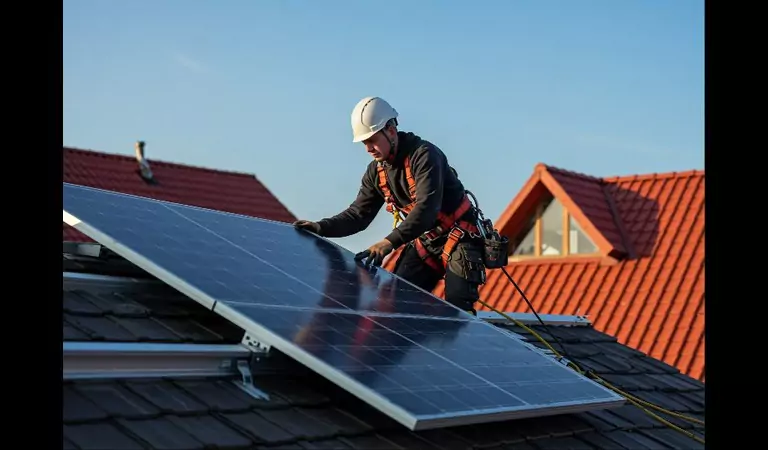

Switching to solar power is one of the best investments a homeowner can make today. Not only does it dramatically reduce electricity bills but it also encourages environmental sustainability. With rising energy bills and a greater emphasis on lowering carbon footprints, solar panels are becoming more popular among Australian families. However, installing a solar system is a sophisticated electrical undertaking that necessitates precision, safety, and adherence to rules.
One of the most overlooked but vital aspects of this transition is understanding the electrical work involved. This blog explores 7 essential electrical tips for home solar power installation. A poorly executed installation might result in inefficiencies, safety hazards or even legal issues. That is why it is very important to consult the best electrician Australia, who will assist you through the procedure and ensure that everything runs smoothly from beginning to end.
Before beginning solar panel installation, it is critical to estimate your home's existing electricity load. Every household has a unique energy consumption pattern, which helps determine the appropriate size and capacity of the solar power system.
A skilled electrician will assess your present and future energy requirements based on appliances, lighting and other electrical components. They can also help identify locations where energy efficiency can be increased. Having this clarity allows you to invest in a solar system that is neither underpowered nor overkill for your home.
Your home's switchboard should function properly with the recently installed solar panels. If you live in old homes and have old switchboards in your house, so it may be unable to resist the additional power from solar inverters or meet modern safety standards.
You may need to upgrade your switchboard, in which case best electrician in Australia really comes into play. They will install any necessary safety switches, evaluate the circuit's capacity, and make sure all local electrical codes are followed. Ignoring this technique could lead to ineffective performance, frequent tripping or even fire concerns.
The inverter is the heart of your solar system, converting the DC electricity generated by the panels into the AC electricity required by your home. Choosing the proper type of inverter (string, micro or hybrid) has a considerable impact on the system's efficiency.
A qualified electrician can help you choose the best inverter based on your roof design, budget, and energy needs. To prevent overheating, they will ensure that it is properly installed, grounded, and positioned. A high quality inverter may be more expensive at first, but its performance and durability will justify the investment.
Solar power systems, like other electrical installations must be properly earthed to avoid the risk of electric shock. In addition, surge protection devices are required to safeguard against voltage spikes generated by lightning or grid fluctuations.
Your electrician will make certain that all metal components, including the frame of the solar panels, are correctly bonded and grounded. Surge protection on both the AC and DC sides of the system provides an additional degree of safety, particularly in storm prone areas. This is an important step to take if you want a system that is both safe and reliable.
If you intend to connect your solar system to the grid then you must meet your energy provider's unique requirements. These include metering, inverter specifications and the ability to export excess energy.
Only a licensed and accredited specialist may meet these technical standards. The top electrician in Australia will work with your energy retailer to install a bidirectional smart meter and verify that all grid connection requirements are followed. Attempting a DIY project or hiring an unqualified installation may cause approvals to be delayed or result in grid disconnection.
While you may not be installing a battery storage system right away, it is advisable to plan for one in the future. A competent electrician will wire your system such that future battery integration is simple and doesn't require a total redesign.
This means selecting an inverter that’s battery ready and wiring in a manner that isolates essential circuits during a power outage. This amount of foresight is crucial if you want energy independence or live in an area that has frequent blackouts.
Australian electrical and solar installation standards are strict for a reason: to protect homeowners from faulty systems and harmful practices. Compliance is not an option; it is the law.
Every component must be certified for Australian use, and installation must be performed by a Clean Energy Council (CEC) accredited professional. Hiring the best electrician in Australia guarantees compliance, quality workmanship, and access to government rebates and warranties. Plus, their work will be covered by insurance, offering you peace of mind.
Although installing a home solar system is a promising step towards sustainability and energy efficiency, it is not a simple plug and play process. Electrical considerations, such as compliance and load predictions, are critical to the success of your solar installation. If you want to switch to solar electricity, don't compromise on quality. Speak with Australia's top electrician if you need help with any aspect of your solar installation. Nothing less is acceptable for your home, finances and safety.
 How to Choose the Right Lighting for Your Home
22 Jul, 2025
How to Choose the Right Lighting for Your Home
22 Jul, 2025
 How Often Should You Check And Replace Fire Alarms?
06 May, 2025
How Often Should You Check And Replace Fire Alarms?
06 May, 2025
 Installing an EV Charger at Home: What You Need to Know
03 Mar, 2025
Installing an EV Charger at Home: What You Need to Know
03 Mar, 2025
 Understanding Circuit Breakers: What Homeowners Need To Know
15 Jan, 2025
Understanding Circuit Breakers: What Homeowners Need To Know
15 Jan, 2025
 Childproof Your Home: 7 Key Electrical Safety Tips
27 Dec, 2024
Childproof Your Home: 7 Key Electrical Safety Tips
27 Dec, 2024